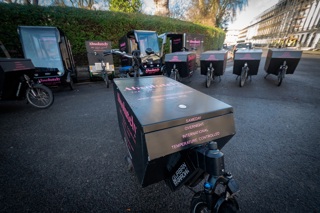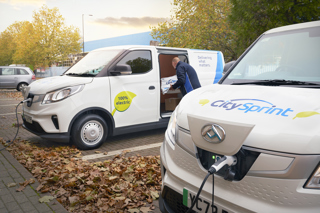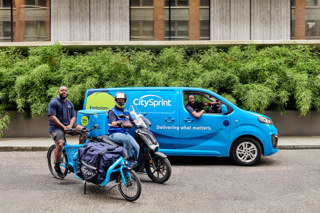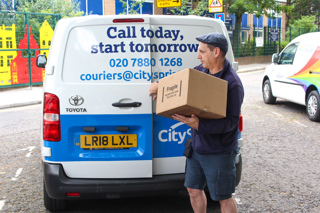Self-employed drivers at a number of delivery and courier fleets in the UK are considering legal action against the companies they work for following a landmark ruling against Uber. A London Employment Tribunal last October ruled that Uber drivers are entitled to holiday pay, national minimum wage and paid breaks – classing them as workers, rather than being self-employed.
Judgement in the first case – a bicycle courier with logistics company City Sprint – was heard last month (January). A tribunal ruled that the courier, Maggie Dewhurst, should be classed as a worker rather than self-employed. It said that City Sprint “unlawfully failed to pay her for two days’ holiday”.
In a statement, City Sprint said it was “disappointed” with the ruling. It stressed that it applied to a single individual and claimed it was not a test case, adding: “Because of the complexity of the judgement, we will be reviewing it in detail.”
City Sprint said there was “widespread confusion” regarding this area of law and called on the Government to provide better support for other companies which could also be affected.
Self-employed drivers for other couriers, including Addison Lee, Excel and E-Courier, are also taking legal action.
GMB, the union for professional drivers, helped to bring the case against Uber last July with the help of employment lawyers Leigh Day.
Nigel Mackay, Leigh Day solicitor, told Commercial Fleet: “There are a lot of companies that operate in a similar way (to Uber) that are labelling their drivers as self-employed.
“My advice to those companies is to deal with this issue now. We are receiving interest from drivers and couriers that are drivers for multiple companies, not just Uber. They will want to see if they will also be able to claim for backdated pay.”
Using self-employed drivers allows delivery companies to scale their fleets up and down during seasonal peaks and troughs. A move away from self-employed drivers could mean they –and couriers – will have to take on more employed drivers and potentially increase usage of short-term rental vehicles to manage demand. Some delivery fleets in the UK, like Royal Mail, already increase their fleet size by up to 25% to cope with the peak delivery season.
Uber filed papers to appeal the ruling on December 13 and said it will not change its employment policies until the result of the appeal. According to GMB no date for a result on the appeal has been set.
If Uber does not succeed in getting the ruling overturned it will be liable for any difference in pay for drivers if there has been a shortfall in wages, backdated up to two years prior to the ruling. Mackay said the same outcome could follow for all delivery and courier fleets that use self-employed drivers.
Steve Garelick, GMB branch secretary for professional drivers, said: “The fact Uber is appealing the decision shows what sort of company it is. Most companies would have wiped their mouths and adapted their working processes.
“Other companies should take note. Forgetting workers and their life/work balance needs is a fundamental error.”
Leigh Day’s court case used two Uber drivers as an example during proceedings last summer.
A spokesman for Uber said: “Tens of thousands of people in London drive with Uber precisely because they want to be self-employed and be their own boss. The overwhelming majority of drivers who use the Uber app want to keep the freedom and flexibility of being able to drive when and where they want. While the decision of this preliminary hearing only affects two people we’re appealing it.”
The Government has already asked HM Revenue & Customs (HMRC) to launch an investigation into delivery company Hermes after 78 delivery drivers alleged they received pay lower than the UK’s current minimum wage.
Hermes is cooperating with the investigation and said the drivers involved represent less than 1% of the 10,500 couriers it works with in the UK.
A spokesman from HMRC told Commercial Fleet it has no update on Hermes as it “does not comment on individual cases”, adding: “HMRC will always take action where it believes an employer is not paying its workers the national minimum wage or national living wage which they are legally entitled to.”
He said the department recovered more than £10 million of underpaid wages for 58,000 workers between 2015 and 2016. A specialist unit, called the employment status and intermediaries team, has been set up by HMRC to investigate companies who opt out of giving workers employment protections by using agency staff or calling them self-employed.
Jane Fielding, a partner at the law firm Gowling WLG, said: “If Uber’s appeal is rejected, it could change the face of the employment landscape for many thousands of people in similar situations.”
However, Fielding said that as the decision is at the employment tribunal level, the ruling with Uber is only “persuasive in future cases” and will not be binding on other employment tribunals. She said future cases brought against other companies will depend on their own facts.
The decision against Uber coincides with a Government inquiry launched by the Business, Energy and Industrial Strategy (BEIS) Select Committee into ‘The future world of work and rights of workers’. The inquiry accepted written evidence submissions until December 19 last year and the committee is expected to hear verbal evidence sessions in the coming weeks.
Colin Tourick, professor of automotive management at the University of Buckingham Business School, said: “The bottom line is that fleets which use outsourced agents to deliver their goods need to look now at how these delivery drivers are being remunerated.
“If they are employed, no problem. But if they are ‘self-employed’ there may be changes coming down the line that could hit delivery costs and companies’ delivery budgets.”
Tourick said fleet managers may have to look at hiring short- to medium-term rental vehicles to meet peak demand if rules on using self-employed drivers change.
APC Overnight would not give numbers on its fleet size but has 10% of its HGVs operating in-house and the remainder through vendor agreements. Each APC Overnight depot is an independent employer, with the "vast majority" of couriers being employed.
Colin Rann, APC Overnight operations director, said: “We are aware of the ruling and we’ll have to wait and see what the outcome will be and the processes we’ll have to put in place.
“Dependent on what happens with the appeal there could very well be a step change in how the industry looks at self-employed drivers.”
A spokesperson for Yodel told Commercial Fleet it is too early to tell how the Uber ruling will affect self-employed industry models overall – but it is monitoring public interest in the sector and how competitors react.
The company has 10,300 drivers, of which approximately 40% are employed directly, 40% are self-employed contractors and 20% work for third party agencies who support the Yodel network.
These numbers change dependent on the volume of parcels it has to handle, for example, during Christmas.
She said: “At Yodel, we offer a range of employment opportunities including employed and self-employed roles. We find many people choose self-employed roles at Yodel, because the flexibility suits their lifestyle.”
The majority of Royal Mail drivers are on permanent contracts and it offers guaranteed hours, holiday pay, sick pay and national insurance and employer pension contributions. A spokesperson for Royal Mail said its delivery network is supported by Parcelforce Worldwide self-contracted owner-drivers, but the average earnings for them is between £45,000 and £70,000 a year.
Royal Mail also utilises a “small number” of self-employed couriers through its same day eCourier delivery service. It could not confirm the number.
The spokesperson said: “In addition to the ability to earn competitive rates of pay, our couriers are not tied to working a particular number of hours. This provides the flexibility many of them look for in their work.”
Guglielmo Meardi, professor of industrial relations and director of the industrial relations research unit of Warwick Business School, said the Uber and City Sprint rulings will help to demystify the rhetoric surrounding the so-called ‘gig economy’ and stimulate debate around the challenges surrounding work that does not fit into traditional categories.
Meardi argues the safer option for companies may be to consider self-employed drivers as employed with access to workers’ rights as a default in the future.
He said: “Over recent years self-employment has increased, but often coming with bad conditions, prompting fears it was being used to bypass employment legislation.
“Other recent cases, such as Hermes and the Government’s pressure on rogue employers, are likely to lead to proposals to clarify and tighten legislation.”






















driver - 11/11/2017 12:09
I was a Home delivery driver for yodel. Make no mistake, Yodel and other companies saying people do this kind of work for a flexible lifestyle is a smokescreen for paying well below minimum wage!